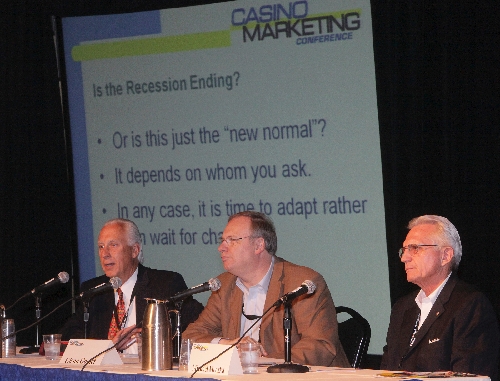Pain for locals is pain for gaming
Ask an economist whether the recession is over and he'll say it officially ended in June 2009. But ask average Las Vegas residents and they'll argue that jobs are still hard to find, housing prices have yet to recover and they have less discretionary income.
No industry wants the economy to recover more than gaming does. Casino revenues are driven by consumer spending patterns that depend on disposable income, panelists said Tuesday during a Casino Marketing Conference discussion on the recession's impact.
Even with the wide array of nongaming amenities that have become substantial revenue generators for resorts, gambling still drives those resorts' financial health.
"A turnaround in the housing market is key," said David Line, president and CEO of the business research firm InfoSearch International. "I think we are in this for a few more years to come."
Line said the gaming industry nationwide is dealing with a "new normal" of customers who have cut the frequency of their casino visits and who spend less when they do go out.
"The whole industry is built around discretionary income. People have less discretionary income to spend on gambling," Line said.
The conference examining all aspects of casino marketing concludes today at Planet Hollywood Resort. Panel discussions also addressed how the Internet could increase slot revenues and how social media can be used to market a property.
On Tuesday, Victor Rocha, owner and editor of Pechanga.net, also was honored with the 2011 Casino Marketing Lifetime Achievement Award.
Michael Meczka, principal of marketing research company MM/R/C Inc., cited Federal Reserve figures to illustrate how the recession has affected the average gaming consumer.
Since 2008, he said, average consumers' net worth has decreased 28 percent and their wealth factor has declined by 23 percent. Meanwhile, the median value of a stock portfolio dropped 33 percent and the median value of a home fell 15 percent.
"It continues to be the economy," said Meczka, adding that this new universe will hold constant for the next decade.
The recession's impact has factored in the average U.S. household becoming more financially conservative, he said. Consumers are saving money, taking fewer risks with discretionary dollars and 1 in 4 plan to postpone retirement -- all factors that affect the gaming industry, he said.
Meczka said surveys conducted by his research firm show that people still go to area or locals casinos about as frequently as they did before the recession, although they aren't spending as much. He described it as consumers seeking a "low-cost, high-value" experience.
Glenn Goulet, chief executive officer of casino and game management systems maker Table Trac Inc., said the profile of the typical gambler has changed in the past few years.
Goulet said a recent survey his company did for several casino clients show the 55-and-older demographic is no longer the typical consumer. Today, it's the 35-to-49 age demographic, he said.
"Baby boomers are worried about having enough (money) for retirement," Meczka said. "People are also concerned that the recession is here to stay."
Contact reporter Chris Sieroty at
csieroty@reviewjournal.com or 702-477-3893.




























